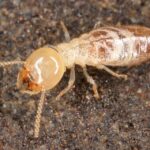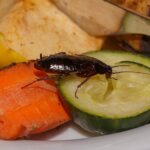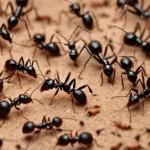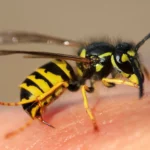Home » Pest Guide » Ants » Pharaoh Ants
Pharaoh Ants
Pharaoh ants are one of the most difficult indoor ant species to eliminate.
These tiny, pale yellow ants form massive colonies that spread through walls, plumbing, and electrical wiring — making them a serious issue in kitchens, apartments, and healthcare facilities.
Because they can split their colonies when disturbed, DIY sprays usually make infestations worse. Effective control requires targeted baiting and expert monitoring.
What Pharaoh Ants Look Like
Pharaoh ants are light yellow to reddish with darker abdomens and are only 1.5–2 mm long — about the size of a sesame seed.
They can easily be mistaken for grease or sugar ants due to their small size.
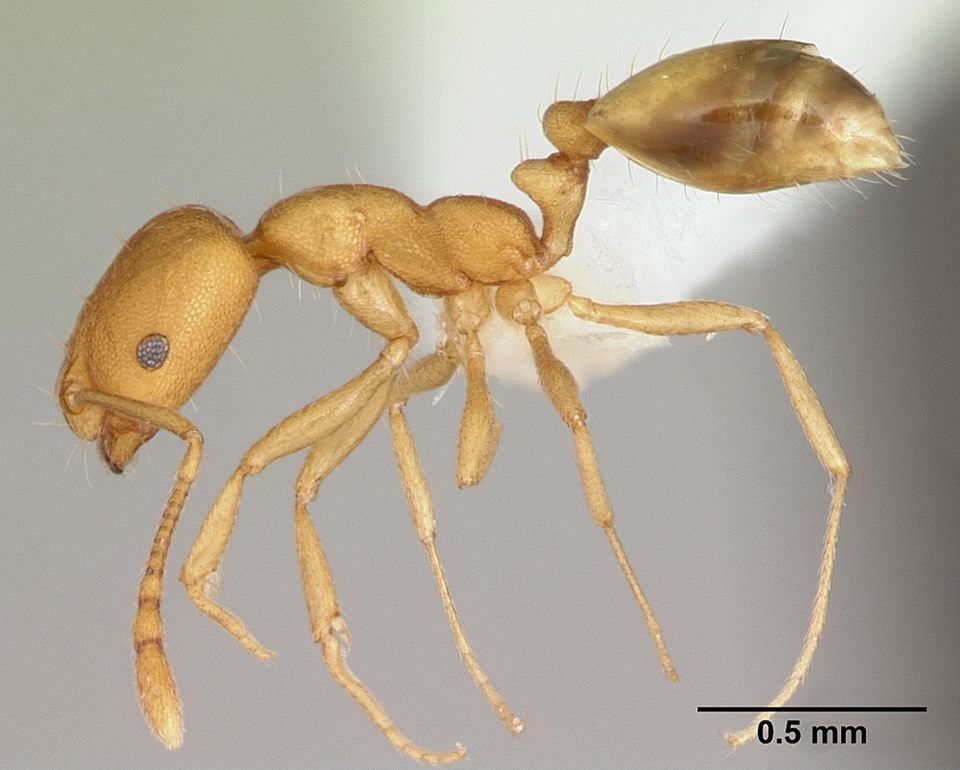
Key identifying features include:
- Two distinct nodes on the “waist” between thorax and abdomen
- Non-aggressive, but persistent and fast-moving
- Prefer warm, humid, indoor environments
- Found in kitchens, hospitals, and food storage areas
Call Now: 1 (888) 292-1108
Behavior and Nesting Habits
Pharaoh ants live entirely indoors in multi-colony systems. Each nest can contain hundreds of queens — meaning even if one nest is destroyed, others can rebuild elsewhere.
They nest in warm, humid areas such as:
- Wall voids, behind baseboards
- Electrical outlets or switch plates
- Kitchens, bathrooms, and under sinks
- Medical and food preparation equipment
⚠️ Colonies can “bud” into new nests when sprayed, quickly doubling the infestation.
Health Risks of Pharaoh Ants
Unlike most ants, Pharaoh ants are considered a public health concern because they can carry and spread pathogens.
Common risks include:
- Contaminating food and medical equipment
- Transmitting bacteria like Salmonella and Staphylococcus
- Infesting sterile hospital rooms or IV lines
- Nesting near heat or moisture sources like appliances
🚫 Hospitals and restaurants often require immediate professional intervention to control Pharaoh ants safely. Contact us today!
Signs of a Pharaoh Ant Infestation
- Tiny yellow or reddish ants visible around kitchen counters or sinks
- Sightings near electrical outlets or wall voids
- Persistent ants in bathrooms or near moisture sources
- Food contamination in cupboards or pantries
- Multiple small trails in different rooms
Pharaoh Ant FAQs
Why are Pharaoh ants so hard to kill?
They live in multiple colonies with many queens. Sprays cause them to split into new nests, multiplying the problem.
Are Pharaoh ants dangerous?
Yes. They can spread bacteria and contaminate food, making them a serious concern in kitchens and hospitals.
What’s the best way to eliminate Pharaoh ants?
Non-repellent baiting systems applied by professionals. DIY sprays typically worsen infestations.
Where do Pharaoh ants come from?
They’re tropical ants that thrive indoors in warm, humid environments, often entering through plumbing or electrical conduits.
Can I prevent Pharaoh ants naturally?
Keeping kitchens dry, sealing cracks, and eliminating food residue helps, but professional control is usually necessary.
Get Your Free Ant Control Quote
Pharaoh ants spread quickly through kitchens, hospitals, and food storage areas. Our discreet treatments remove colonies without contaminating surfaces.
Seeing ant activity around your home or business? Our licensed pest control specialists locate nests, eliminate entire colonies, and keep them from coming back. We use safe, targeted treatments that work for any type of ant — indoors or outdoors.
Don’t wait until the infestation spreads — request your free quote today and protect your property year-round.
How to Get Rid of Pharaoh Ants
🚫 Avoid Spraying
Pharaoh ants scatter when exposed to repellents or insecticides, creating new colonies in the process. Instead, focus on bait-based control that targets workers and queens.
Professional Treatment
Our Pharaoh ant control specialists use non-repellent baits placed strategically near nesting zones. These baits are slow-acting, allowing worker ants to carry them deep into colonies — eliminating queens and satellite nests.
We also provide follow-up monitoring to ensure full eradication and prevent re-infestation.
Prevention Tips
- Keep counters and sinks dry and free of crumbs.
- Store food in sealed containers.
- Regularly clean kitchen appliances and drains.
- Fix water leaks and reduce humidity.
- Seal gaps around windows, plumbing, and wiring.
- Schedule professional pest inspections every 6–12 months.

When to Call a Professional
Because Pharaoh ants reproduce rapidly and scatter when disturbed, professional help is the only reliable solution.
Our team identifies all nesting zones, deploys strategic bait systems, and monitors activity until colonies are fully eliminated.
Do you have another Pest Issue?
What our Customers Say about Us!
Trustindex verifies that the original source of the review is Google. Great service for the price tbhTrustindex verifies that the original source of the review is Google. Goat services and didn’t have a problem ever sense.Trustindex verifies that the original source of the review is Google. Best service hands down!! As a first time customer, all I know is this they definitely got the job done and will be recommending them to everyoneTrustindex verifies that the original source of the review is Google. I been having a bugs everywhere and been terrified and they help me so much getting the bugs awayTrustindex verifies that the original source of the review is Google. Did an amazing job helping me with my ants .Trustindex verifies that the original source of the review is Google. I was having problems with my roaches in my house and they did a good job getting rid of emTrustindex verifies that the original source of the review is Google. this man does really good he killed all the pests in my house 😮🫡Trustindex verifies that the original source of the review is Google. Very accommodating for emergency service request. Also prompt in time for appointments. Great company!!Verified by TrustindexTrustindex verified badge is the Universal Symbol of Trust. Only the greatest companies can get the verified badge who has a review score above 4.5, based on customer reviews over the past 12 months. Read more


